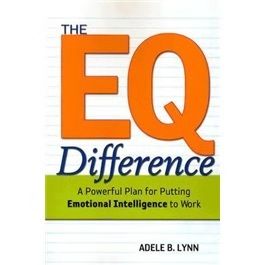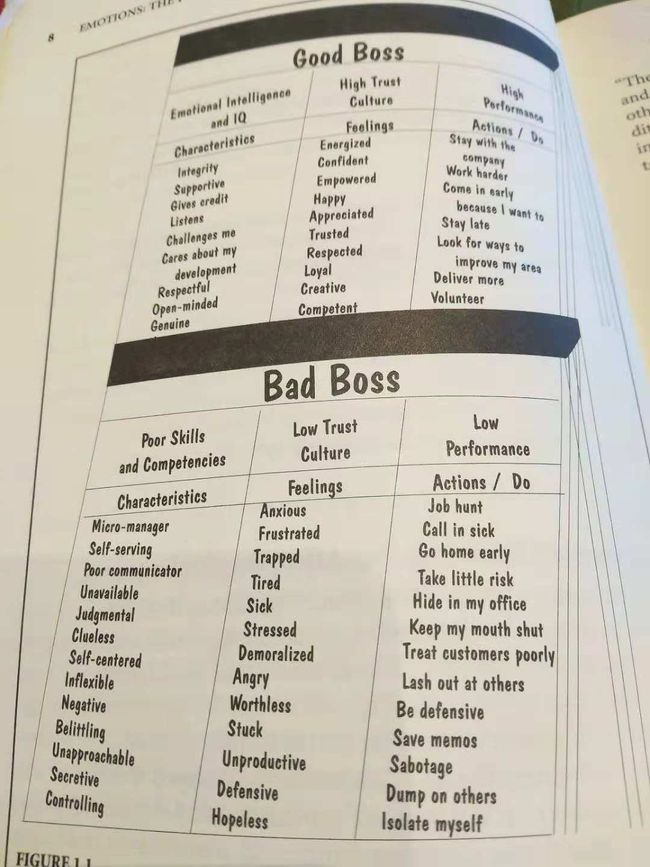Take a few minutes to think about the characteristics of the best boss you ever have worked for.. How about a bad boss?
Tell me how you feel when you work for this good boss, How about bad one?
What does the good boss makes you want to do or not do on your performance? How about bad one?
If you come up with a list as below, then you're not alone. Now let's think about what do you learn from this? It seems that other people's behaviors can affect our feelings, our feelings can influence our performance, and performance can be enhanced through our positive behaviors. And this is why Emotional intelligence matters?
People talk About EQ a lot, but what is it exactly I asked several people and they gave me answers, like awareness, perceive other people's feeling, connected with others, motivate others, make people happy without telling a lie, being gently and always focus on the goals. Emotional intelligence has been defined as "the ability to monitor one's own and other people's emotions, to discriminate between different emotions and label them appropriately, and to use emotional information to guide thinking and behavior" by Peter Salovey and John Mayer. This definition was later broken down and refined into four proposed abilities: perceiving, using, understanding, and managing emotions. In the book, the EQ difference, mentioning about five components:
1. Self-awareness and self-control: the ability to fully understand oneself and to use that information to manage emotional productivity.
2. Empathy: the ability to understand the perspectives of others.
3. Social expertness: the ability to build genuine relationships and bonds and to express caring, concern, and conflict in healthy ways.
4. Personal influence: the ability to positively lead and inspire others as well as oneself.
5. Mastery of purpose and vision, the ability to bring authenticity to one's life and live out one's intentions and values.
In another book Emotional Intelligence by Daniel Goleman, outlines five mainly constructs.
1. Self-awareness: the ability to know when she motions strength weakness drives values and goals, and recognize their impact on others While using gut feelings to guide decisions.
2. Self-regulation: involves controlling and redirecting once disruptive emotions and impulses and adapting to changing circumstances.
3. Social skill: manage relationships to move people in the desired direction.
4. Empathy: considering other people's feelings, especially when making decisions.
5. Motivation: being driven to achieve for the sake of achievement.
Based on the definition, it seems three of the components are focus on ourselves. And it should be from inside out to improve. There are seven steps to emotional intelligence for the self coach.
1. Observe. Do self-scan, identify your emotions and mood, name them, find out the trigger.
2. Interpret. Analysis information, the purpose of analysis to determine stimuli and patterns that are uniquely yours, and to determine just how the stimuli and patterns affect you at the moment. Normally the patterns come from our experience, and we barely notice it.
3. Pause. A shift in your physical moment To change channel And break old patterns. Allowing for another form of expression of that emotion, a form of expression that will ultimately serve you better.
4. Direct. Direct his or her emotional impact to gain the desired result. It's all about acting or behaving in a way that will increase your likelihood of leaving your intentions and advancing your purpose in life.
if we follow our old pattern, we will act as below:
A (activating event or circumstance) + B (Belief about activating event fueled by our triggers) = C (upsetting emotional response and a regrettable action)
What if we can take a shift and direct to another direction.
A (activating event or circumstance) + B (Belief about activating event fueled by our triggers) + C (redirect belief and thoughts) = D (upsetting emotional response and a regrettable action)
5. Reflect. Review and reflect of our daily interactions with others is our mental practice and becoming wiser. It's not about reflecting solely on our feelings. It is essential that also reflect on the fact on how others actually received information or interaction, not what we intended for them to receive.
6. Celebrate. Develop An appreciation for those moments and celebrate. Celebration is fun. And the serves an important function of emotional intelligence. We are go work in progress. And sometimes it's just best to take a look at work and admire it and celebrate.
7. Repeat. Affirm the direction, then let go and follow the path. Emotional intelligence requires constant learning. The focus of the learning is to help us leave our intentions. The more you imagine living your intentions, the more you will live them.
Change happens not by only knowing, but by acting. As you are aware of why emotional intelligence important, what it is, and how to improve it, how about give it a try? Make a plan, take action, and here a journey begin...

